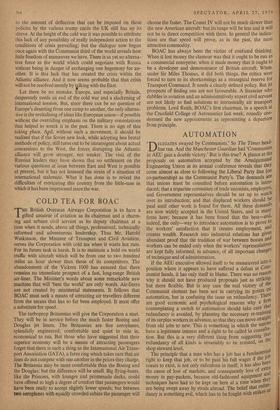COLD TEA FOR BOAC
THE British Overseas Airways Corporation is to have a .gifted amateur of aviation as its chairman and a charm- ing and urbane civil servant as 'its deli:My chairman at a time when it needs, above all things, professional, technically informed and adventurous leadership. Thus Mr. Harold Watkinson, the Minister of Transport and Civil Aviation, serves the Corporation with cold tea when it wants hot rum. For its future task is harsh. It is to maintain a hold on world traffic with aircraft which will be from one to two hundred miles an hour slower than those of its competitors. The abandonment of the Vickers 1000 has ensured that there remains no immediate prospect of a fast, long-range British air-liner. The Minister's words about some remarkable new machine that will 'beat the world' are only words. Air-liners are not created by ministerial statements. It follows that BOAC must seek a means of attracting air travellers different from the means that has so far been employed. It must offer a substitute for speed.
The turboprop Britannias will give the Corporation a start. They will be in service before the much faster Boeing and Douglas jet liners. The Britannias are fine aeroplanes, splendidly engineered; comfortable and quiet to ride in, economical to run. But those who have suggested that their superior economy will be a means of attracting passengers forget that there is such a thing as the International Air Trans- port Association (IATA), a fares ring which takes care that air lines do not compete with one another in the prices they charge. The Britannia may be more comfortable than the Boeing and the Douglas; but the difference will be small. Big flying-boats, like the Princess, with lounges and promenade decks, could have offered so high a degree of comfort that passengers would have been ready to accept slightly lower speeds; but between two aeroplanes with equally crowded cabins the passenger will choose the faster. The Comet IV will not be much slower than the new American aircraft; but its range will be less and it will not be in direct competition with them. In general the indica- tions are that speed will prove, as in the past, the most attractive commodity.
BOAC has always been the victim of confused thinking. When it lost money the clamour was that it ought to be run as a commercial enterprise; when it made money that it ought to be a developer and demonstrator of British aircraft. When, under Sir Miles Thomas, it did both things, the critics were forced to turn to its shortcomings as a strategical reserve for Transport Command. It needs a clearly defined policy. But its prospects of finding one are not favourable. A financier who dabbles in aviation and an administratively expert civil servant are not likely to find solutions to intrinsically air transport problems. Lord Reid'. BOAC's first chairman, in a speech at the Cranfield College of Aeronautics last week, roundly con- demned the new appointments as representing a departure from principle,










































 Previous page
Previous page